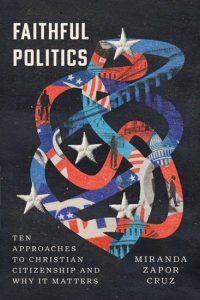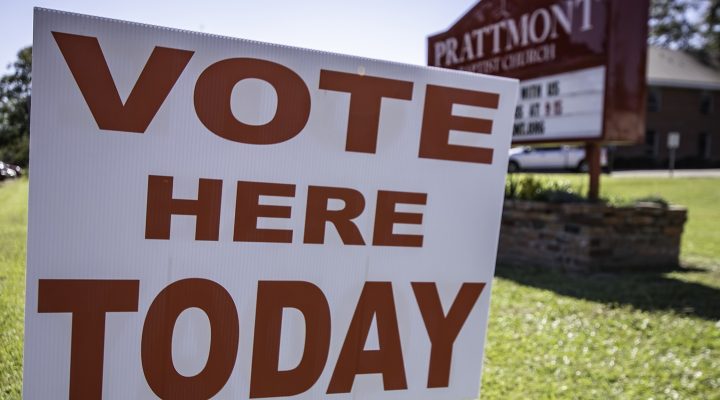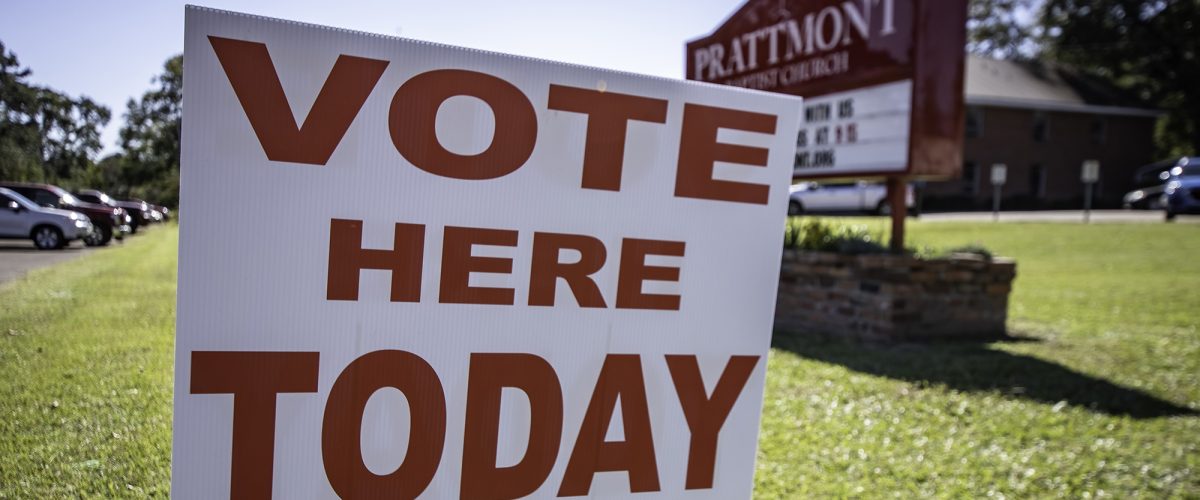Theology professor Miranda Zapor Cruz was raised to believe one American political party could save the country and the other was evil. Her new book is created to give readers a better education on Christian civics than the one she received.
In Faithful Politics: Ten Approaches to Christian Citizenship and Why It Matters, Cruz, professor of historical theology at Indiana Wesleyan University, seeks to do for politics what Niebuhr’s Christ and Culture did for culture by showing how different branches of the Christian tree have embraced differing approaches to engaging with government over the past 20 centuries.
 Cruz says Christians are dual citizens serving two kingdoms and must work to balance obligations to the kingdom of God and the earthly realm they inhabit. Faithful citizenship requires more than outsourcing political views to religious leaders, as she was taught to do.
Cruz says Christians are dual citizens serving two kingdoms and must work to balance obligations to the kingdom of God and the earthly realm they inhabit. Faithful citizenship requires more than outsourcing political views to religious leaders, as she was taught to do.
She challenges believers to study the Bible, theology and history so they can form political values and behaviors that contribute to God’s eternal mission and bear witness to Christian principles before an increasingly secular nation.
Over the centuries, Christians have done politics in 10 different ways that fit into six conceptual frameworks, ranging from “complete separation and complete conflation of kingdom and country,” she says.
Four faithful approaches
Cruz says Christians who embrace four general approaches explained below can do so faithfully as followers of Christ seeking to fulfill the church’s mission in the world.
“Keep the kingdom out of the country.” These separatists, many of them Anabaptist, pursue holiness through a “strategic withdrawal” focused on “maintaining a clear distinction between the world and the church” to model a combination of “radical isolation and prophetic witness.”
In Europe, early Anabaptists, including Mennonites and Swiss Brethren, refused to vote, hold office or serve in the military.
Their countercultural stance could result in persecution or execution, but they believed they were making a necessary rejection of the conflation of faith and government seen in Constantine’s time and in later centuries in Europe where, she writes, “One was born Christian the same way one was born French or English.”

Miranda Zapor Cruz
Stanley Hauerwas and William Willimon hailed the separatist model in 1989’s Resident Aliens: Life in the Christian Colony, and this approach is carried on today by the Amish, the Bruderhof, Orthodox writer Rod Dreher, and Shane Claiborne’s Simple Way community in Philadelphia.
“Keep the country out of the kingdom.” These separatists, many of them Baptist, are different from the above group in affirming participation in civic duties while insisting on a strict line of separation between church and state for the protection of both.
America’s founders fought over whether their new country should have an established religion. Separationists helped disestablishment win the day.
Baptists embraced separation because of their doctrine of soul competency and their experience of persecution in Britain, Cruz writes. “Historic Baptist separation maintains that the government should have no authority over religious practices or individual faith.”
Martin Luther’s approach toward separation emphasized distinct roles for church (which is responsible for people’s souls) and state (which is responsible for their bodies): “If your prince or temporal ruler commands you to side with the pope, to believe thus and so, or to get rid of certain books, you should say, ‘Gracious sir, I owe you obedience and body and property; command me within the limits of your authority on earth, and I will obey. But if you command me to believe or to get rid of certain books, I will not obey; for then you are a tyrant and overreach yourself.’”
“Historic Baptist separation maintains that the government should have no authority over religious practices or individual faith.”
“Bring the kingdom into the country.” Some Christians have promoted various Social Gospel approaches, such as John Wesley who emphasized works of mercy, such as interpersonal acts of charity, that display love of neighbor; Charles Finney, the father of modern revivalism, who promoted a union of personal and social reform, said, “Now the business of the church is to reform the world”; and Walter Rauschenbusch and others who in the late 19th and early 20th centuries proclaimed a social gospel that would realize the kingdom of God here and now.
Over time, a Social Gospel approach would be seen in the Civil Rights Movement, Mainline Protestantism, and the evangelical left, but critics complain that the Social Gospel offers a tepid version of Christ’s true gospel, she says.
“Keep the country under the kingdom” This is epitomized in two Calvinist approaches that see government and church as partners in an effort “to form our social behavior to civil righteousness.”
Some follow Calvin’s model of “direct Christian influence” first seen in the “godly commonwealth” of Geneva in the 1530s. Under Calvin’s reforming leadership, citizens were required to sign a confession of faith or leave the city.
Others follow Abraham Kuyper’s model of “common grace.” As prime minister of the Netherlands, Kuyper “adapted Calvin’s theology for a religiously diverse country with a representative government.” He said all Christians had a cultural mandate to participate in and bless cultural formation.
Two unfaithful approaches
Cruz sees two other approaches as less faithful to the teachings of Jesus, even though both are experiencing an uptick in popularity.
“Invading the country to establish the kingdom.” This is the mindset behind dominionism, which Cruz describes as Christians who seek to gain dominion over all spheres of society, and Christian reconstructionism, which sees Christian practice as radically anti-democratic and incompatible with America’s constitutional form and values. The law of Moses should be the law of the land, they say.
“Eroding the distinction between kingdom and country.” This is embodied in today’s virulent form of Christian nationalism, which Cruz calls “a political approach to Christianity,” not “a Christian approach to politics.” Political ideology comes first and foremost, and national identity often crowds out Christian identity.
“Americans are not God’s chosen people,” she writes. “Those who trust in Jesus from every tribe, tongue, people and nation are.” And America’s founding documents weren’t inspired by God, “a status Christian orthodoxy reserves for Scripture alone.”
Related articles:
Was America born as a Christian nation? It’s more complicated than that | Analysis by Rodney Kennedy
Josh Hawley seeks revival of ‘Our Christian Nation,’ condemns ‘atheist left’
‘Christian nation’ ideology came early and has stayed late in American history
The Social Gospel ghosts of Rauschenbusch and Roosevelt haunt evangelicals still | Analysis by Rodney Kennedy


